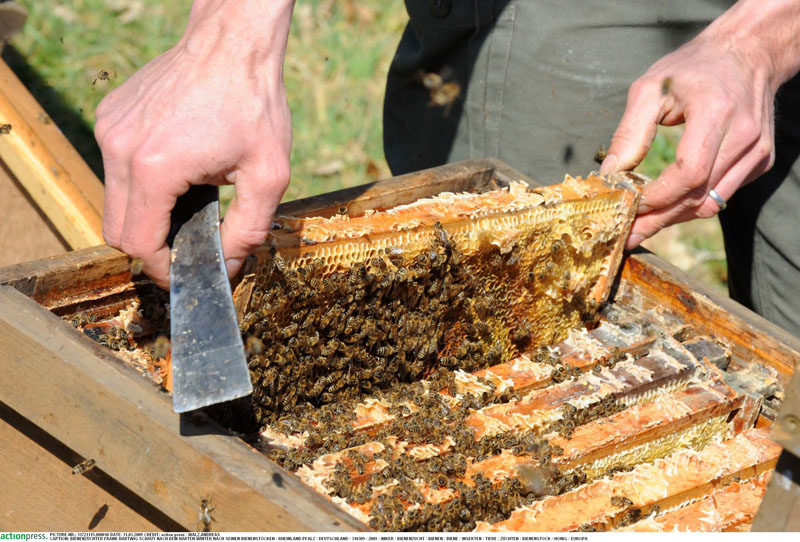This week, over 60,000 people signed an online petition started by Allan Campbell, a commercial beekeeper in Dauphin, Man., demanding that Billy Bee, Canada’s biggest honey packer, stop mixing Argentine honey with the Canadian product.

In April, apparently, it’s honey; in March, it was ketchup.
After pressure from Canadian customers, Loblaws said last month it will re-stock French’s ketchup after a public backlash over the grocery giant’s decision to remove the Canadian-made product from its shelves across the country.
It would seem that Canadian consumers have Canadian farmers’ backs, and they’re not a force to be lightly messed with.
The petition “went a lot farther than I ever dared to dream for,” Campbell says.
It was inspired by his frustration at not being able to sell his crop.
“I have sold two or three loads of honey to Billy Bee for years and years,” he explained. “But this year, we’re being told flat-out ‘No, we’re not interested, we have everything we need.’ That’s all the explanation that a producer gets.”
Unsold honey is now stockpiled in his warehouse.
Among the comments on the online petition:
- “I’m signing because this is complete and utter bullsh*t. You’re putting people out of business who will be forced to get employment elsewhere. My family relies on this deeply, and have not been able to sell their honey yet this year because they are only buying Chinese honey.”
- “Canadian honey is a natural product that hasn’t been changed by the manufacturers. It is far healthier than most exported honey. I also believe we should use as many products as possible that are Canadian born and raised.”
- “Maybe we need to go talk to French’s about starting up a honey division. They’ve done great things for ketchup in Canada.”

Get daily National news
Campbell says his petition was inspired by the Ontario-based campaign to make ketchup from Canadian-grown tomatoes more available in Canada.
“Right on the tails of that, you see what kind of support that they got. That started completely virally, with one guy posting on his Facebook page. It wasn’t started by French’s. I just thought: ‘wow, if Canadian beekeepers could get that kind of support, that would just be outstanding.'”
READ MORE: Loblaws to re-stock French’s ketchup, made with Canadian tomatoes
Billy Bee’s corporate Facebook page, largely used to publish recipes involving honey, is now hosting a furious debate about the company’s honey-buying practices. Comment threads on recipes for honey-glazed ham, rosemary and paprika smoked vegetables and confetti almond Easter bunnies are mostly devoted to upbraiding Billy Bee and its corporate parent, McCormick Canada, and the company’s responses.
A spokesman for Billy Bee said the company only uses a small percentage of honey from Argentina to ensure the flavour remains consistent.
“We continue to source the majority of our honey from Canadian beekeepers,” said Andrew Foust, McCormick’s VP of Marketing, Canada. “Currently, at least 85 per cent of the honey we use is sourced from Canada.”
He said the company is disappointed by the petition and it’s assertion McCormick Canada has stopped buying Canadian honey.
“I want to reiterate that 85 per cent of our honey is sourced from Canada, which is why we find the claims in the petition so surprising,” Foust said.
The Canadian Honey Council hasn’t taken a position on Campbell’s petition, chair Kevin Nixon said.
“So far, from the numbers that we’re seeing, there is imported honey coming in, but we’re not sure that it’s at a significant volume where it’s damaging the industry.”
“I guess every pound coming in is a pound that’s not being supplied by Canadian producers, but the fact is that it is nothing new, and it’s been going on for years.”
Strong honey harvests in the U.S. and Canada last year have hurt prices, as well as lowering American demand for Canadian honey, he explained. (The U.S. can’t meet its own honey demand from its own production, so about half of the Canadian honey crop is exported there.)
“These companies are in business to be profitable, and currencies can play into it. Argentina produces at the opposite time as us. There was a large production in Argentina last year, and they were hanging on to some of that crop, hoping for higher prices. Last fall their currency started devaluing, and they were willing to sell for a lower price. It puts us at a place where we’re having to compete with that.”
In the meantime, Nixon cautions consumers to look at the back of a jar, not the front, to tell where their honey is produced.
“‘Canada No. 1 White’ does not mean it’s a product of Canada. It’s just a grading system. Quite often, if you turn and look at the back of the label, in smaller print it may say ‘blend of Canadian and Argentine,’ or ‘blend of Canadian and Chinese’. I find that misleading.”
“In a perfect world, it would be nice if every packer out there was using Canadian honey as their product in their jar. Of course we would love to see that.”

A Kelowna beekeeper and viticulturist is hoping to turn the tide on colony collapse. Gabe Cipes is concerned the declining bee population could lead to less produce. He wants to see Okanagan neighbourhoods returned to a more natural environment. Doris Maria Bregolisse reports.



Comments